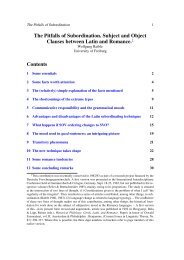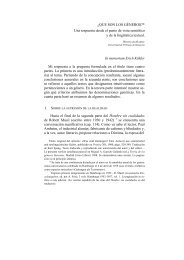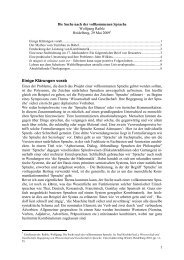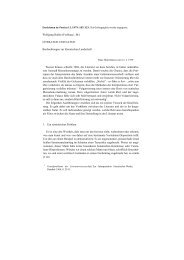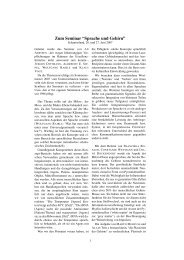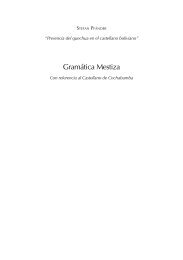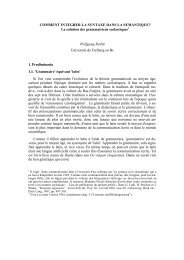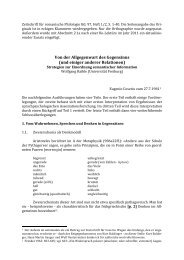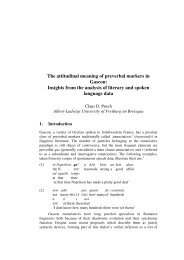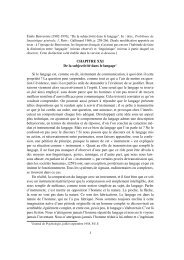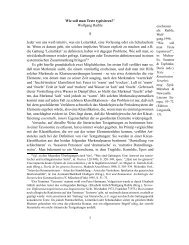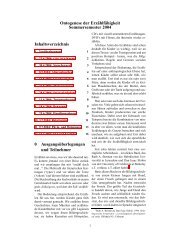A Summary of Role and Reference Grammar
A Summary of Role and Reference Grammar
A Summary of Role and Reference Grammar
Create successful ePaper yourself
Turn your PDF publications into a flip-book with our unique Google optimized e-Paper software.
quate grammatical theories. In place <strong>of</strong> these notions, RRG employs the notion <strong>of</strong> ‘privileged<br />
syntactic argument’ [PSA], which is a construction-specific relation <strong>and</strong> is defined as a restricted<br />
neutralization <strong>of</strong> semantic roles <strong>and</strong> pragmatic functions for syntactic purposes. The other arguments<br />
in a clause are characterized as direct or oblique core arguments; there is nothing in RRG<br />
corresponding to direct or indirect object.<br />
PSAs may be characterized functionally as controllers or pivots. These two functions are<br />
exemplified in (5) <strong>and</strong> (6).<br />
(19) a. The tall mani hit Williamj <strong>and</strong> then i/*j ran away.<br />
CONTROLLER PIVOT<br />
b. Williamj was hit by the tall mani <strong>and</strong> then *i/j ran away.<br />
CONTROLLER PIVOT<br />
(20) a. Billi persuaded the tall manj [__*i/j to visit Sam].<br />
CONTROLLER PIVOT<br />
b. The tall manj was persuaded by Billi [__*i/j to visit Leslie].<br />
CONTROLLER PIVOT<br />
Pivots are canonically the missing argument in a construction, as in (19) <strong>and</strong> (20), while controllers<br />
prototypically supply the interpretation for a pivot. It should be noted that there can be<br />
pivots without controllers, e.g. the extracted element in an extraction construction, <strong>and</strong> controllers<br />
without pivots, e.g. agreement controllers. A further contrast is highlighted in (19) <strong>and</strong> (20),<br />
the contrast between syntactic <strong>and</strong> semantic pivots <strong>and</strong> controllers. In the construction in (19),<br />
the controller is the first NP in the core, the traditional ‘subject’, regardless <strong>of</strong> its semantic function,<br />
whereas in the construction in (20), the controller is the undergoer argument, regardless <strong>of</strong><br />
its syntactic status. Hence the controller in (19) is a syntactic controller, while the controller in<br />
(20) is a semantic controller. The types <strong>of</strong> pivots <strong>and</strong> controllers that the constructions <strong>of</strong> a language<br />
have are typologically very significant.<br />
The linking system relating semantic <strong>and</strong> syntactic representations is summarized in Figure<br />
18. Syntactic functions like PSA <strong>and</strong> direct core argument represent the syntactic pole <strong>of</strong> the<br />
system, while logical structures represent the semantic pole. In every language with grammatical<br />
relations, there is an accessibility to PSA hierarchy for multiple-argument verbs; it is the actorundergoer<br />
hierarchy interpreted from the actor end, i.e. arg <strong>of</strong> DO > 1st arg <strong>of</strong> do´ > 1st arg <strong>of</strong><br />
pred´ (x, y) > 2nd arg <strong>of</strong> pred´ (x, y) > arg <strong>of</strong> pred´ (x). In syntactically accusative constructions<br />
in languages like English <strong>and</strong> German, the highest ranking argument is the default choice<br />
for PSA, whereas in syntactically ergative constructions in languages like Dyirbal, it is lowest<br />
ranking argument which is the default choice. That is, in a syntactically accusative construction<br />
the unmarked choice for the PSA <strong>of</strong> a transitive verb is the actor, with the undergoer being a<br />
marked choice possible only in a passive construction. On the other h<strong>and</strong>, in a syntactically ergative<br />
construction, the unmarked choice for the PSA <strong>of</strong> a transitive verb is the undergoer, with<br />
the actor being a marked choice possible only in an antipassive construction. With an intransitive<br />
verb, the hierarchy is irrelevant, as the single macrorole functions as PSA regardless <strong>of</strong><br />
whether it is actor or undergoer. It should be noted that in most languages the highest ranking<br />
23




